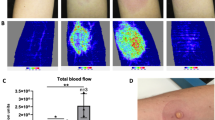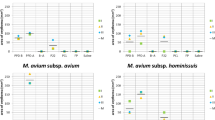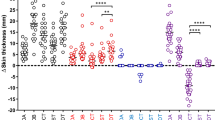Abstract
KOCH1 first reported that when guinea-pigs which had been infected 4–6 weeks previously with tuberculosis were challenged intracutaneously (i.e.) with a small number of virulent organisms, there was induration and necrosis within 48 h, and localisation of the challenge dose. This phenomenon (classical tuberculin-type hypersensitivity) has often been regarded as a direct correlate of protective immunity. But, the same challenge dose was not localised if injected intramuscularly (i.m.). This raised the possibility that ‘protection’ from the i.e. challenge was a trivial consequence of necrosis and sloughing of the infected skin. The controversy was highlighted by Wilson2 who noted that pre-immunised guinea pigs showing an exquisite degree of hypersensitivity at the time of a small i.m. challenge with virulent Mycobacterium tuberculosis died more than 40 d before unimmunised controls, whereas weakly hypersensitive animals showed protection. We describe here a form of delayed foot-pad response which is evoked by all the non-pathogenic mycobacteria studied, but differs from the Koch-type response in timing and suppressor cell activity. It is not seen following injection of pathogens, and it is suggested that failure to evoke this response may account for their pathogenicity.
This is a preview of subscription content, access via your institution
Access options
Subscribe to this journal
Receive 51 print issues and online access
$199.00 per year
only $3.90 per issue
Buy this article
- Purchase on Springer Link
- Instant access to full article PDF
Prices may be subject to local taxes which are calculated during checkout
Similar content being viewed by others
References
Koch, R. Dtsch Med. Wschr. 17, 101–102 (1891).
Wilson, G. S., Schwabacher, H. & Maier, I. J. Path. Bact. 50, 89–109 (1940).
Stanford, J. L. & Gunthorpe, W. J. Br. J. exp. Path. 52, 627–637 (1971).
Mackaness, G. B., Auclair, D. J. & Lagrange, P. H. J. natn. Cancer Inst. 51, 1655–1667 (1973).
Kazda, J. Zbl. Bakt. Hyg., I. Abt. Orig. A237, 81–89 (1977).
Katz, S. I., Parker, D. & Turk, J. L. Nature 248, 612–614 (1974).
Ohmichi, Y., Nomoto, K., Yamada, H. & Takeya, K. Immunology 31, 101–110 (1976).
Bjune, G. & Barnetson, R. St C. Clin. exp. Immun. 26, 397–402 (1976).
Mackaness, G. B. J. exp. Med. 116, 381–406 (1962).
Preston, P. M., Carter, R. L., Leuchars, E., Davies, A. J. S. & Dumonde, D. C. Clin. exp. Immunol 10, 337–357 (1972).
Mackaness, G. B. Am. Rev. resp. Dis. 97, 337–344 (1968).
Miller, T. E., Mackaness, G. B. & Lagrange, P. H. J. natn. Cancer Inst. 51, 1669–1676 (1973).
Author information
Authors and Affiliations
Rights and permissions
About this article
Cite this article
ROOK, G. Three forms of delayed skin-test response evoked by mycobacteria. Nature 271, 64–65 (1978). https://doi.org/10.1038/271064a0
Received:
Accepted:
Published:
Issue Date:
DOI: https://doi.org/10.1038/271064a0
This article is cited by
-
Vaccination against tuberculosis: Is BCG more sinned against than sinner?
Immunology & Cell Biology (1993)
Comments
By submitting a comment you agree to abide by our Terms and Community Guidelines. If you find something abusive or that does not comply with our terms or guidelines please flag it as inappropriate.



